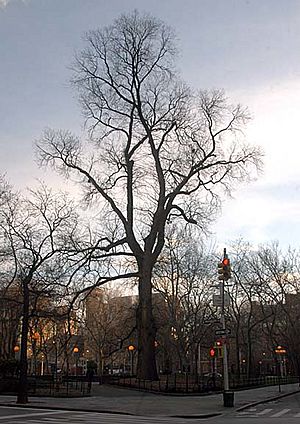Hangman's Elm facts for kids
The Hangman's Elm, sometimes called "The Hanging Tree," is a very old English Elm tree. You can find it in the northwest part of Washington Square Park in Greenwich Village, Manhattan, New York City. This impressive tree stands tall at about 135 feet (41 meters) and its trunk is around 67 inches (1.7 meters) wide.
A Very Old Tree
In 1989, experts from the New York City Department of Parks and Recreation figured out that this English Elm was about 310 years old. Today, they say it's more than 300 years old! Because of its age, many people believe it's the oldest known tree in all of Manhattan. The Hangman's Elm has lived longer than other famous old trees in the city. These include Peter Stuyvesant’s pear tree and a huge Tulip poplar tree that used to be in Washington Heights.
The "Hanging Tree" Story
For a long time, people have called this tree "The Hanging Tree." Stories about hangings happening from its branches started appearing in the late 1800s. However, these stories came out many years after the supposed events.
Historians have done a lot of research into the park's past. They found that the tree was actually on a private farm until 1827. That's when the city bought the land and added it to Washington Square Park. There are no official records that show anyone was ever hanged from this specific tree.
The only recorded execution in this general area happened in 1820. A person named Rose Butler was hanged for arson (setting fires). But she was hanged from a gallows (a special structure for hangings) in the city's old burial ground, called a potter's field. This spot was about 500 feet (150 meters) away from where the elm tree stood. At that time, a small stream called Minetta Creek ran between the burial ground and the farm where the elm was.
Inspiration for a Book
The Hangman's Elm has even inspired writers! A writer named Susan M. Silver wrote a book in 2020 called The Ballad of Hangman’s Elm. It's a story told from the tree's point of view, and it's a parable (a story with a lesson) about the COVID pandemic.
See also
 In Spanish: Olmo de los ahorcados para niños
In Spanish: Olmo de los ahorcados para niños
 | Roy Wilkins |
 | John Lewis |
 | Linda Carol Brown |


